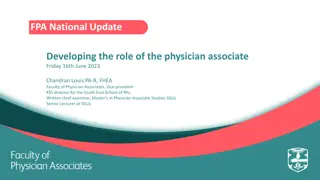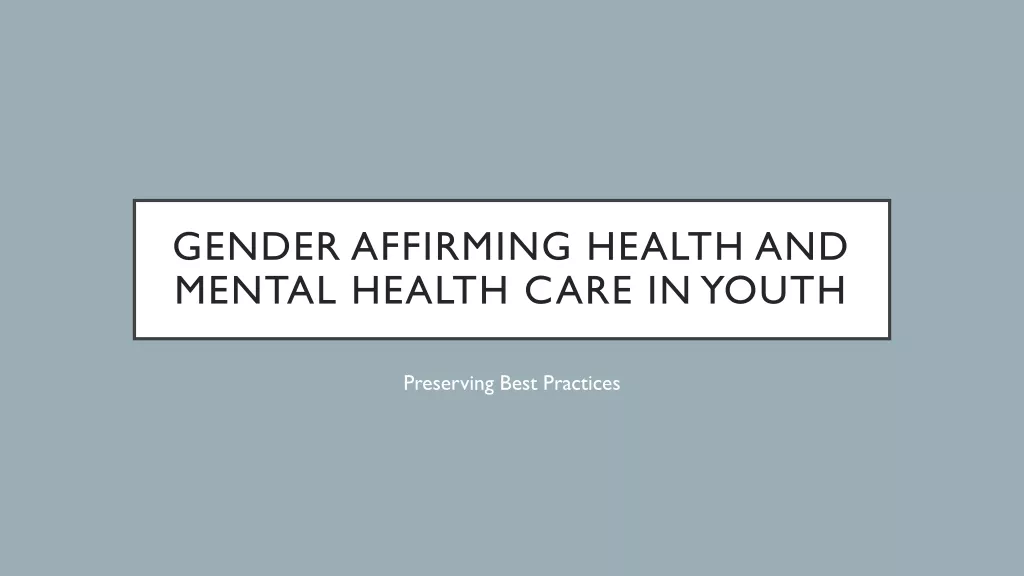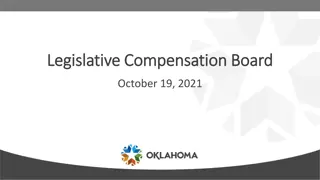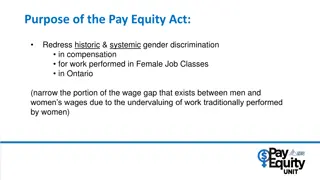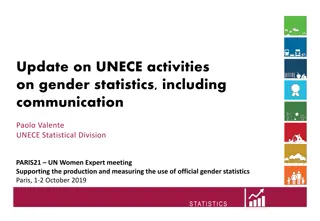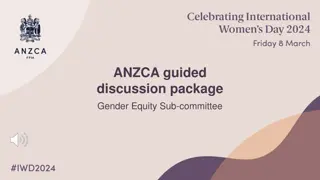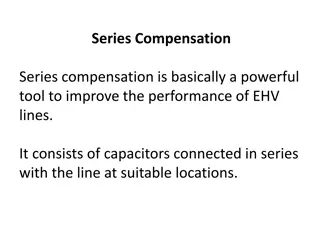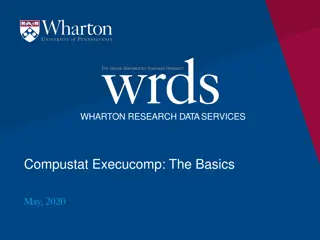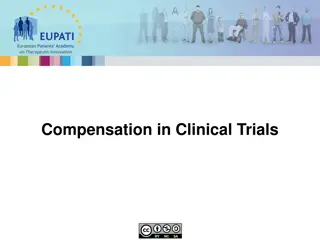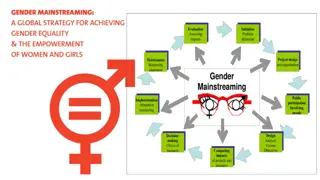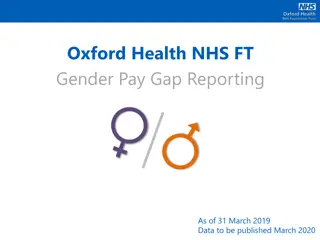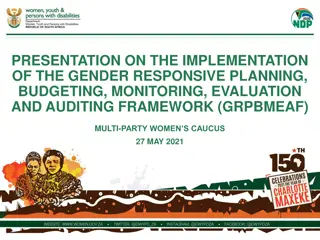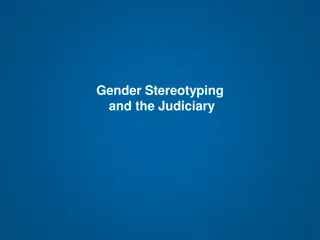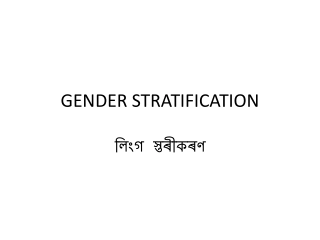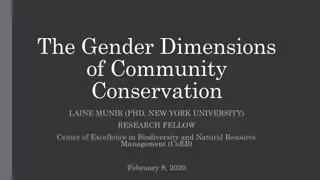Achieving Gender Equity in Physician Compensation and Career Advancement
The American College of Physicians (ACP) emphasizes equitable physician compensation based on skills and expertise rather than personal identity like gender. They advocate for transparent assessment of compensation arrangements, universal access to family and medical leave, and policies promoting gender equality in healthcare.
Download Presentation

Please find below an Image/Link to download the presentation.
The content on the website is provided AS IS for your information and personal use only. It may not be sold, licensed, or shared on other websites without obtaining consent from the author. Download presentation by click this link. If you encounter any issues during the download, it is possible that the publisher has removed the file from their server.
E N D
Presentation Transcript
Achieving Gender Equity in Physician Compensation and Career Advancement: A Position Paper of the American College of Physicians Position Statements and Recommendations Renee Butkus, BA; Joshua Serchen, BA; Darilyn V. Moyer, MD; Sue S. Bornstein, MD; and Susan Thompson Hingle, MD; for the Health and Public Policy Committee of ACP
Position Statement One ACP affirms that physician compensation (including pay; benefits; clinical and administrative support; clinical schedules; institutional responsibilities; and where appropriate, lab space and support for researchers) should be equitable; based on comparable work at each stage of physicians' professional careers in accordance with their skills, knowledge, competencies, and expertise; and not based on characteristics of personal identity, including gender. Physicians should not be penalized for working less than full-time. 2
Position Statement One: Case Study Challenge Potential Solution Dr. W is a third-year resident in internal medicine who is exploring her career options after residency. She is very interested in returning to her hometown to serve the indigent where she was raised. She knows that there is a dearth of African American physician role models so is excited to return home. As she is discussing her contract with a colleague who is also interested in working for the same clinic with identical experience and position description, she is made aware that her contract offer is 30% less than that of her white male colleague. Recognizing Dr. W's valid concerns, Dr. W's potential new boss looks into it and finds out that she is correct. The offer is changed so that she is offered the same as her male colleague. In addition, he begins routinely and transparently providing deidentified data about compensation, stratified for rank and time in rank, for both new hires and current faculty. This is shared with every faculty member during the hiring and annual faculty review process. 3
Position Statement Two ACP supports transparency and routine assessment of the equity of physician compensation arrangements by all organizations that employ physicians. 4
Position Statement Three ACP supports the goal of universal access to family and medical leave policies that provide a minimum 6 weeks of paid leave and calls for legislative or regulatory action at the federal, state, or local level to advance this goal. Such legislation should include minimum paid leave standards and dedicated funding to help employers provide such leave. Paid leave policies should ensure that all employees have increased flexibility to care for family members, including children, spouses, partners, parents, parents-in-law, and grandparents. 5
Position Statement Three (cont.) a. ACP opposes discrimination on the basis of reproductive status, for those who choose to have children biologically or via adoption and for those who choose not to have children. b. Family and medical leave and paid leave policies should be a standard part of physicians' benefit packages, regardless of gender. 6
Position Statement Three (cont.) c. Residency and fellowship programs, academic medical centers, community hospitals, and physician practices should develop and implement paid leave policies to provide compensation to eligible male and female physicians and trainees for a minimum of 6 weeks to care for a newborn, newly adopted, or seriously ill child and to attend to other qualifying life events, such as care of seriously ill family members other than children. 7
Position Statement Three (cont.) d. Medical schools and residency and fellowship training programs should publish and distribute their family and medical leave policies to all applicants. e. Accrediting bodies for medical education and training should establish policies regarding family and medical leave for students and trainees, supporting a minimum of 6 weeks to care for a newborn, newly adopted, or seriously ill child and to attend to other qualifying life events, such as care of seriously ill family members other than children. f 8
Position Statement Three (cont.) f. Medical specialty boards should be flexible in their requirements for board eligibility in circumstances when trainees took family or medical leave. 9
Position Statement Three: Case Study Challenge Potential Solution f. Medical specialty boards should be flexible in their requirements for board eligibility in circumstances when trainees took family or medical leave. returning, she is informed that the leave was unpaid because institutional policy treats adoption as family leave, which is unpaid. Had the leave been maternity leave, it would have been paid. Dr. H is an early-career physician. After she and her husband adopt an infant son, she takes 6 weeks of family leave. Upon Dr. H and Dr. L, a colleague from pediatrics who experienced the same challenge, work with their employer to change the policy. The policy now allows for 6 weeks of paid leave for maternity leave, which includes adoption of a child. They are continuing to work on changes that will expand it to a parental leave policy that includes fathers. 10
Position Statement Four ACP supports the provision of programs in leadership development, negotiation, and career development for all physicians and physicians-in-training. 11
Position Statement Four: Case Study Challenge Potential Solution ACP supports the provision of programs in leadership development, negotiation, and career development for all physicians and physicians-in-training. Medicine as well as chair of the Board of Directors of a prominent national medical organization. Despite these remarkable accomplishments, she shies away from attention and often passes up opportunities for fear of being underqualified for the next step. She is concerned that a next step could be a glass cliff and does not want to worsen the cause for women in medicine by failing. Dr. J is a successful academic physician who has achieved the status of full professor and who serves as chair of the Department of Dr. J believes that the best approach to her personal and organizational concerns will require multilevel interventions. She meets with her faculty development dean to review how other institutions have addressed the imposter syndrome and glass cliff barriers. They obtain information and actionable practices from other institutions and implement programs to improve the confidence, skills, and leadership qualities of individual faculty. 12
Position Statement Five ACP supports the provision of regular and recurring implicit bias training by all organizations that employ physicians. Organizational policies and procedures should be implemented that address implicit bias. 13
Position Statement Five: Case Study Challenge Potential Solution ACP supports the provision of regular and recurring implicit bias training by all organizations that employ physicians. Organizational policies and procedures should be implemented that address implicit bias. department and finds that women and underrepresented minorities progress substantially more slowly than others. Curious that the Department of Medicine Promotion and Tenure Committee has only 1 woman and 1 underrepresented minority, Dr. F, the new chair of the Department of Medicine, reviews promotion data for his After finding that women and underrepresented minorities progress substantially more slowly than others, Dr. F implements processes within the Department of Medicine that assure that each annual performance review of individual faculty members includes a discussion about promotion needs and timelines. 14
Position Statement Six Academic institutions, health care organizations, physician private practice groups, and professional physician membership organizations should take steps to increase the number of women in practice, faculty, and leadership positions and structure equal access to opportunities, including: 15
Position Statement Six (cont.) a. Encouraging mentorship and sponsorship and providing training for faculty on how to be effective mentors and sponsors. b. Coaching and development programs. c. Flexibility in structuring career paths in academic medicine, health systems, and private practice and adopting flexible promotion and advancement criteria, including promotion tracks that reflect the wide range of responsibilities and unique contributions of female physicians. 16
Position Statement Six (cont.) d. Requiring the inclusion of female physicians as job candidates and members of search committees. e. Ensuring diversity, including gender diversity, on all committees, councils, and boards through leadership development to ensure inclusion, comprehensiveness, and mechanisms for accountability. 17
Position Statement Six: Case Study Challenge Potential Solution Dr. T serves as the only woman department chair at an academic medical center. In addition to raising 3 children and caring for her aging mother, she is a well-known academic triple threat who maintains an active clinical practice, is an award-winning teacher and medical educator, and consistently secures NIH funding for her research on hypertension. The academic institution she works for has convened a search committee for its next dean. She is interested in becoming dean. Knowing the influence chairs can have, she is disappointed to learn that during an informal gathering that included many of the chairs, the chairs had not even considered her for the dean position because they assumed she was too busy. Dr. K is the dean of a medical school and calls for a review of diversity and inclusion status and policies in the institution, including a baseline needs assessment, installation of a Diversity and Inclusion Task Force whose composition specifically weights underrepresented minority and female faculty to review the survey data, current status of formal and informal processes that feed the leadership pipeline, organizational changes from this actionable data, and accountable metrics to track progress in the leadership and advancement for all faculty. 18
Position Statement Seven Further research is needed on the reasons for and effect of gender pay inequity and barriers to career advancement and the best practices to close these gaps across all practice settings. 19
Position Statement Seven: Case Study Challenge Potential Solution Further research is needed on the reasons for and effect of gender pay inequity and barriers to career advancement and the best practices to close these gaps across all practice settings. take care of not only their medical problems but also their Pap smears and psychosocial issues. Her quality metrics and patient satisfaction ratings are the highest in her practice. During her annual performance review, she is notified that she will need to increase her productivity or take a pay cut because her RVUs are lower than those of her colleagues. She believes that this is due to the additional time she spends per patient visit. Dr. G prides herself on being a highly sought- after internal medicine specialist because of the comprehensive, patient-centered care she provides to her patients. Many women patients seek care from her because she will Dr. G asks for her practice to consider tracking the additional gynecological and mental health care provided, as well as weighting quality metrics and patient satisfaction, for all members in her practice. She offers to work with her management and colleagues to find a compensation model that will acknowledge and incentivize these additional metrics. Her practice agrees because they want to retain physicians. 20
Position Statement Eight ACP opposes harassment, discrimination, and retaliation of any form based on characteristics of personal identity, including gender, in the medical profession. 21



